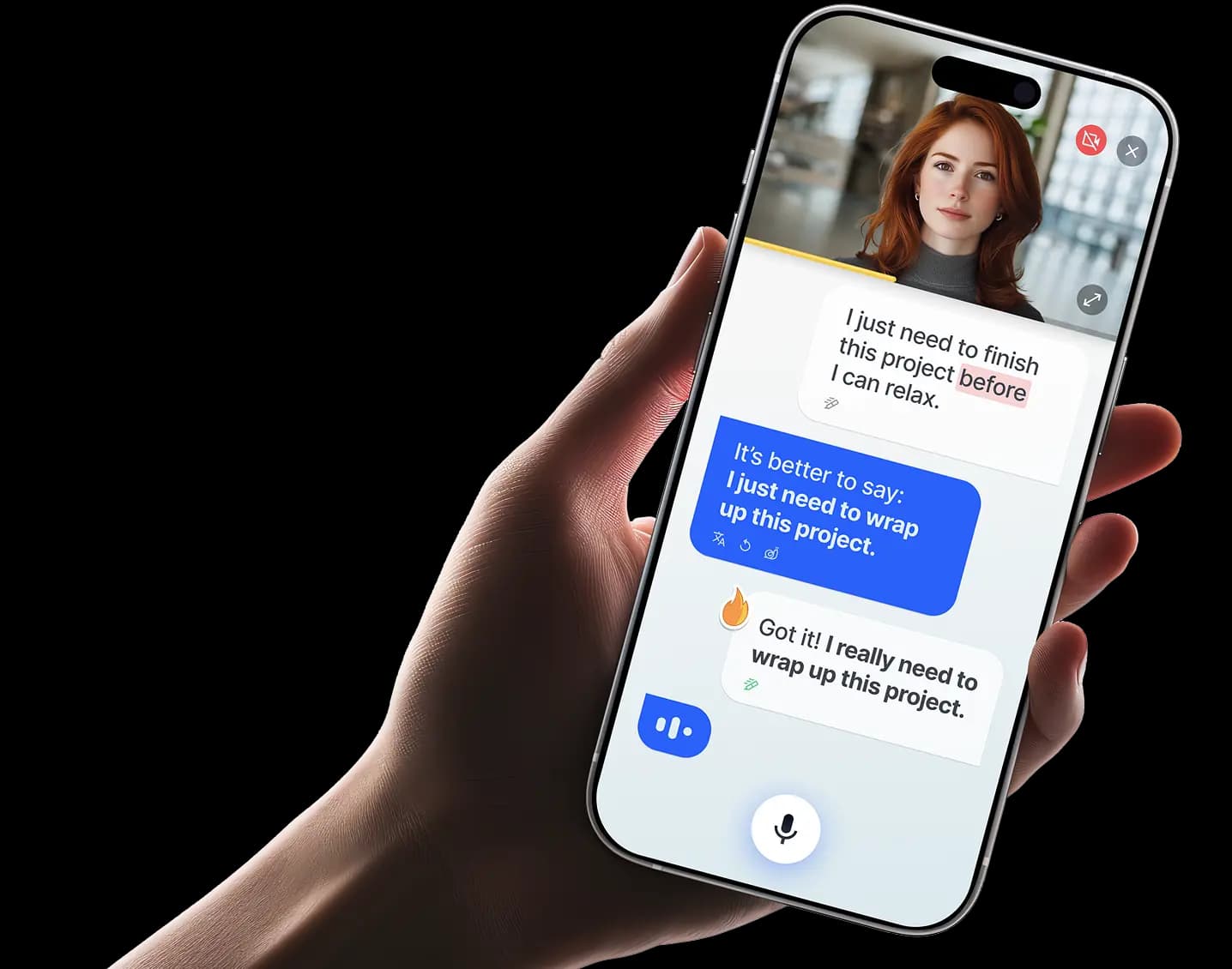Improve Fluency with Basic English Conversation for Everyday Use

English conversation skills unlock doors, from classrooms to boardrooms, and across continents. Yet, mastering them remains frustratingly elusive for millions.
Many non-native speakers find themselves trapped between overly complex course outlines and childish learning apps, neither of which prepares them for real-world interactions. This practical guide cuts through that frustration, offering straightforward pathways to basic English conversation without drowning in grammar rules.
Whether you're an international student struggling to join class discussions, a professional trying to figure out how to learn English conversation with subtle workplace cues, this article is for you.
The guide addresses the exact challenges that prevent meaningful communication by focusing on high-frequency expressions, cultural context, and confidence-building techniques. It offers accessible strategies to transform hesitation into fluent expression through practical English you'll actually use tomorrow.
Key takeaways
Further into this guide, the following are some of the key takeaways to note:
- A list of common English conversation topics, with separate categories
- Tips on improving conversational skills
- Steps to help you focus on high-frequency expressions and cultural contexts
The importance of basic English conversation skills
While English textbooks focus on perfect grammar, real life rewards conversation. That job interview? It hinges on small talk before the formal questions. That classroom participation grade? It depends on your willingness to speak up, even imperfectly.
Common English conversation skills (i.e., the ability to introduce yourself, ask questions, express needs, and engage in everyday exchanges) determine whether you thrive or merely survive in English-speaking environments.
Studies consistently show that employers value communication abilities over technical perfection, and social integration depends far more on willingness to engage than on flawless speech.
For many learners, the greatest obstacle isn't knowledge but confidence. Mastering fundamental conversation patterns creates the psychological safety to practice, make mistakes, and improve.
When you can navigate basic interactions successfully, each conversation becomes an opportunity rather than a threat.
Top 50 basic English conversation topics
We’ve picked the top English conversation topics, progressing from essential everyday exchanges to deeper discussions that build genuine connections. Each category represents a conversational sphere you'll encounter regularly in English-speaking environments.
Getting to know you
These simple English conversation examples allow you to make a personal introduction:
Names and introductions
Example: "My name is Bob. What should I call you?"
Origins and hometowns
Example: "I grew up in a small city near Osaka. How about you?"
Family makeup
Example: "I have two sisters and a brother. Do you have siblings?"
Living situation
Example: "I'm sharing an apartment with two roommates near campus."
Work and studies
Example: "I'm studying engineering. What's your field?"
Languages spoken
Example: "English is my third language after Korean and Japanese."
Time in current location
Example: "I moved here just three months ago. Everything still feels new."
Weekend activities
Example: "I usually go hiking on Saturdays. What do you do for fun?"
Daily routines
Example: "I'm definitely a morning person. I'm up by 5:30 most days."
Weather adjustments
Example: "I'm still getting used to how humid it is here compared to home."
Practical Survival Conversations
The following are topics you’ll need in English daily conversations with other people:
Asking for directions
Example: "Excuse me, could you tell me how to get to the train station?"
Restaurant ordering
Example: "I'd like the chicken sandwich, but without mayonnaise, please."
Shopping needs
Example: "I'm looking for something warmer than this. Do you have wool socks?"
Transportation options
Example: "What's the best way to get downtown from here on weekends?"
Medical concerns
Example: "I have a headache that won't go away. What would you recommend?"
Service requests
Example: "The shower in my room isn't working properly. Could someone look at it?"
Tech problems
Example: "My laptop won't connect to the WiFi network. Can you help me?"
Payment questions
Example: "Do you accept credit cards or should I pay in cash?"
Scheduling appointments
Example: "I'd like to make an appointment for next Tuesday afternoon."
Emergency needs
Example: "I've lost my passport. What should I do?"

Leisure and interests
These English conversation examples explore your leisure preferences and interests:
Recent movies
Example: "Have you seen that new superhero film? What did you think of it?"
Music preferences
Example: "I mostly listen to indie rock and jazz. What's on your playlist?"
Local attractions
Example: "What's one place you'd recommend I visit while I'm here?"
Sports discussions
Example: "Did you watch the game yesterday? That last-minute goal was amazing!"
Food favorites
Example: "I love trying new cuisines. Have you ever had Ethiopian food?"
Weekend plans
Example: "I'm thinking of checking out that new museum exhibit on Sunday."
Hobby talk
Example: "I've been learning photography in my free time. Do you have any hobbies?"
Exercise routines
Example: "I try to go running three times a week. How do you stay active?"
Travel experiences
Example: "My favorite trip was to Barcelona last year. Where have you traveled?"
Book recommendations
Example: "I just finished this great novel about time travel. What are you reading?"
Building deeper connections
These easy English conversation topics are suitable for deeper conversations with close contacts. Take care to ascertain if the other party is comfortable with these kinds of personal conversations:
Cultural comparisons
Example: "Birthday celebrations are quite different in my country. Here's why..."
Future aspirations
Example: "Eventually, I hope to start my own business. What are your dreams?"
Childhood memories
Example: "Growing up, we spent every summer at my grandparents' farm."
Learning experiences
Example: "My biggest challenge with English is understanding fast speakers."
Work challenges
Example: "Presenting in meetings is still difficult for me, especially handling questions."
Personal values
Example: "Family has always been the most important thing to me."
Lifestyle choices
Example: "I became a vegetarian three years ago for environmental reasons."
Technology views
Example: "I think smartphones have changed how we connect, sometimes not positively."
Cultural traditions
Example: "During our New Year celebration, we always make these special rice cakes."
Life advice
Example: "The best advice I ever received was to speak up even when afraid."
Social navigation
These are conversation topics for navigating social circles and building relationships:
Giving compliments
Example: "That's a great presentation. I especially liked your examples."
Polite disagreement
Example: "I see your point, but I've had a different experience with that."
Expressing gratitude
Example: "Thanks so much for helping me with that report. It made a huge difference."
Making invitations
Example: "Would you like to join us for dinner on Friday around 7:00?"
Offering assistance
Example: "You seem stressed. Is there anything I can help you with?"
Requesting clarification
Example: "I'm not sure I understand. Could you explain that differently?"
Sharing opinions tactfully
Example: "I think the first option might work better because..."
Changing subjects gracefully
Example: "That reminds me, I wanted to ask about the project deadline."
Making apologies
Example: "I'm really sorry I'm late. The bus was delayed due to construction."
Closing conversations
Example: "It was great talking with you. Let's continue this another time."
Tips on improving your basic English conversation skills through engaging discussion topics
It’s possible to develop conversational momentum and genuine confidence when you consistently practice English conversations. Below are some useful tips that can help you get started:
Build a personal story bank
Confidence comes from preparation. Identify five daily English topics you encounter regularly (your job, hometown, family, hobby, daily routine, etc.). For each topic, prepare a 30-second description in English that you practice until it feels natural. For example:
- "I work as an accountant at a construction company. My job involves tracking project expenses and preparing financial reports. It's challenging when we have tight deadlines, but I enjoy working with numbers and seeing projects completed successfully."
When conversation turns to work, you'll have this ready response that showcases vocabulary you've mastered. After sharing your prepared response, add a simple question like, "What about you?" to keep the conversation flowing.
Ask questions that build on answers
Questions are your most powerful tool when learning conversational English. Instead of asking random questions, build each new question from the previous answer:
- Basic: "Do you like to travel?" (Yes/no question)
- Follow-up: "Where's your favorite place you've visited?" (Open question based on their answer)
- Extension: "What made that place special to you?" (Deeper question exploring their experience)
This approach creates natural conversation flow while letting you control the topic's complexity.
Use the mirror-add-ask method
When responding to questions, don't stop at simple answers. Use this three-step approach:
- Mirror: Briefly answer the question
- Add: Provide one additional related detail
- Ask: Return a related question
For example:
Q: "Do you have any siblings?"
A: "(Mirror) Yes, I have one brother. (Add) He's three years younger and works as an engineer in Singapore. (Ask) Do you have brothers or sisters?"
FAQs
How do I start a basic spoken English conversation?
Starting conversations in English is simpler than most learners think. Begin with a greeting matched to the situation:
- Formal: "Good morning/afternoon/evening"
- Casual: "Hi" or "Hello"
- With friends: "Hey" or "What's up?"
Also, add a self-introduction when meeting someone new, and follow with one of the reliable conversation starters discussed in the guide.
What are the basics of English communication?
English communication breaks down into these manageable components:
- Core Building Blocks: Common sentence patterns, question formations, and politeness expressions
- Essential Functions: Introducing yourself, expressing common needs, asking for clarification, etc.
- Cultural Awareness: Appropriate personal space, turn-taking, and expected response to "How are you?".
Many credible English lessons will teach you to focus on mastering these basics before worrying about complex grammar rules.
What are the 5 basic communication skills?
These five skills work together to build your English fluency:
- Active Listening: Understanding spoken English through focused attention
- Clear Speaking: Making yourself understood, without the grand intention to speak English perfectly
- Strategic Reading: Understanding the written English language relevant to your needs
- Functional Writing: Communicating essential information in writing
- Body Language Literacy: Using and reading non-verbal cues appropriately
Each skill reinforces the others, and progress in one area naturally improves the rest.
Engage in personalized conversations with Loora, the most advanced AI English tutor, and open doors to limitless opportunities.
